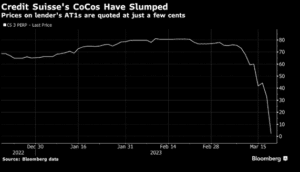
By Ronan Martin
(Bloomberg) — European regulators are rushing to reassure
investors that shareholders should face losses before
bondholders after the takeover of Credit Suisse Group AG wiped
the bank’s Additional Tier 1 debt.
The clauses that led to the bonds being marked to zero
aren’t common. Only the AT1 bonds of Credit Suisse and UBS Group
AG have language in their terms that allows for a permanent
write-down and most other banks in Europe and the UK have more
protections, according to Jeroen Julius, a credit analyst at
Bloomberg Intelligence.
Yet, judging by the market action, investors aren’t
sticking around to find out. All kinds of risky bank debt
tumbled on Monday and analysts predicted far-reaching
consequences to Europe’s funding market. The market for new AT1
bonds will likely go into deep freeze, traders said.
“This just makes no sense,” said Patrik Kauffmann, a fixed-
income portfolio manager at Aquila Asset Management, who holds
Credit Suisse CoCos. “Shareholders should get zero” because
“it’s crystal clear that AT1s are senior to stocks.”
Perpetual notes issued by Deutsche Bank AG, Raiffeisen Bank
International and BNP Paribas SA all dropped on Monday. Deutsche
Bank’s £650 million ($792 million) 7.125% note fell the most
ever.

The wipeout of 16 billion francs ($17.2 billion) of Credit
Suisse’s so-called AT1 bonds is the biggest loss yet for
Europe’s $275 billion market in these securities, which were
created after the financial crisis to ensure losses would be
borne by investors not taxpayers.
In a typical writedown scenario, shareholders are the first
to take a hit before AT1 bonds face losses, as Credit Suisse
also guided in a presentation to investors recently. That’s why
the decision to write down the bank’s riskiest debt — rather
than its shareholders — has provoked a furious response from
some of the bondholders.
Risky Credit Suisse Bond Wipeout Upends $275 Billion Market
Junior creditors should bear losses only after equity
holders have been fully wiped out, according to a joint
statement from the Single Resolution Board, the European Banking
Authority and the ECB Banking Supervision.
Other European officials also weighed in. ECB Governing
Council member Ignazio Visco said at an event in Milan that that
regulators have the tools to deal with liquidity problems, but
there are no issues currently.
Italy’s Finance Minister Giancarlo Giorgetti said the risk
for Italian banks is “not significant.” He added that he was
“surprised” by the Swiss decision to prioritize shareholders
over some bondholders.
If the AT1 new-issue market reopens, equity conversion may
become the dominant loss-absorption mechanism to reassure
investors that they won’t be wiped out ahead of shareholders,
BI’s Julius said.
To contact the reporter on this story:
Ronan Martin in London at [email protected]
To contact the editors responsible for this story:
Hannah Benjamin-Cook at [email protected]
Beth Mellor, Lynn Thomasson